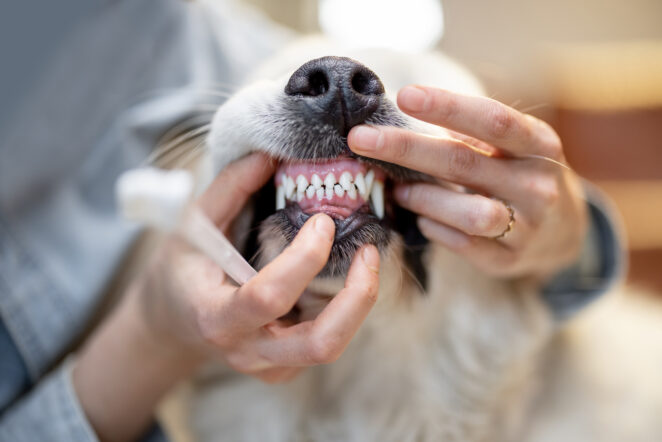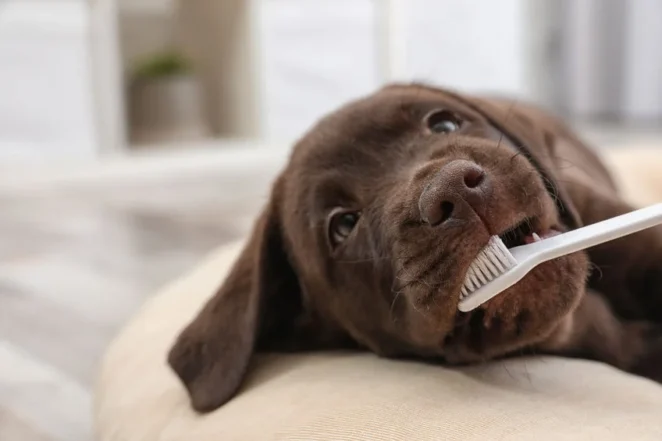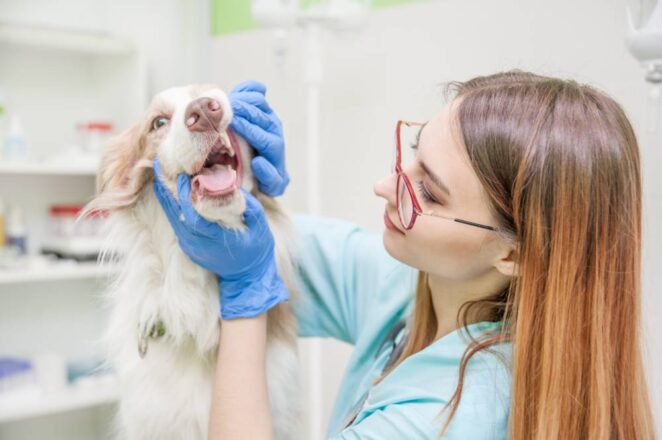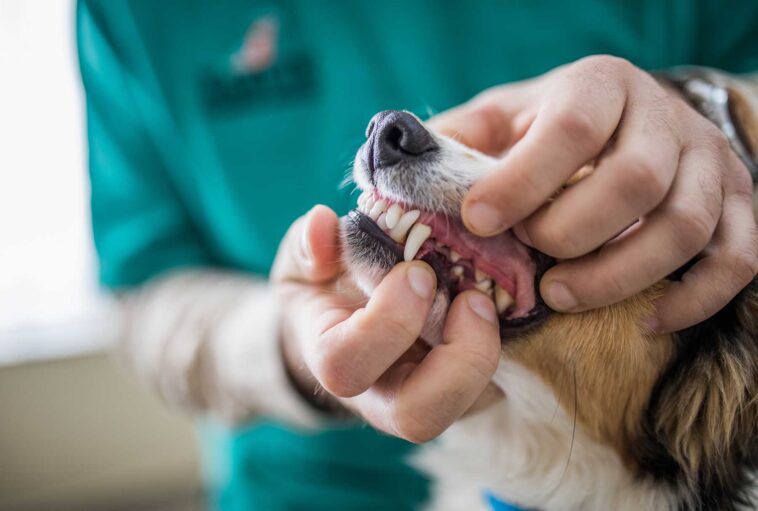Our furry friends bring people so much joy and companionship, becoming cherished members of the family. Just like people, they also require regular healthcare to lead happy and healthy lives. One crucial aspect of pet care that often goes overlooked is dental health. In this blog, we’ll explore the significance of dental care for pets, the common issues they face, preventive measures, and how good oral hygiene can lead to a longer, happier life for your four-legged companions.
The Foundation of Overall Health

Dental health is not just about sparkling white teeth; it’s about maintaining the foundation of your pet’s overall health. Just as in humans, oral health issues in pets can lead to a range of systemic problems. When left untreated, dental problems can affect your pet’s heart, kidneys, liver, and more. The mouth is a gateway to the rest of the body, and neglecting it can have dire consequences.
Proper dental care helps prevent harmful bacteria from spreading throughout your pet’s bloodstream, reducing the risk of serious illnesses. In essence, a healthy mouth contributes to a healthy body, allowing your pet to thrive and enjoy a higher quality of life.
Reduced Pain and Discomfort
Imagine trying to eat with a toothache or gum disease – it’s painful! Pets, too, experience pain and discomfort from dental issues, but they can’t tell us about it. They often suffer in silence, which can lead to changes in behavior, reduced appetite, and even aggression.
Untreated dental problems can cause chronic pain and discomfort for your pet, affecting their daily activities and overall happiness. By addressing these issues promptly, you can ensure that your furry friend remains comfortable and content.
Common Dental Problems in Pets

Plaque and Tartar Buildup
One of the most common dental problems in pets is the accumulation of plaque and tartar on their teeth. Plaque is a sticky film of bacteria that forms on teeth, and if left unchecked, it hardens into tartar. This buildup can lead to gum disease, tooth decay, and bad breath.
Plaque and tartar are more than just cosmetic concerns; they can wreak havoc on your pet’s oral health. As they accumulate, they provide a breeding ground for harmful bacteria that can penetrate the gums and lead to infections. Regular dental care is essential to prevent these issues from taking hold.
Gingivitis
Gingivitis is an inflammation of the gums caused by the accumulation of plaque and tartar. It can cause redness, swelling, and bleeding of the gums. If left untreated, gingivitis can progress to a more severe condition called periodontal disease, which can result in tooth loss.
Gingivitis is a painful condition that can make eating and drinking uncomfortable for your pet. Additionally, the inflammation can lead to more severe dental problems if not addressed promptly. Regular dental check-ups and cleaning can help prevent gingivitis and maintain your pet’s oral health.
Tooth Fractures
Pets, especially dogs, are known for their enthusiastic chewing habits. Unfortunately, this can sometimes lead to tooth fractures. Broken teeth not only cause pain but also create openings for bacteria to enter the bloodstream, potentially causing infections.
Tooth fractures can be agonizing for your pet and can also lead to infections that affect their overall health. Addressing broken teeth promptly through dental procedures can prevent further complications and ensure your pet’s comfort.
Preventive Measures for Dental Care

Regular Veterinary Check-ups
Regular check-ups with your veterinarian are crucial for maintaining your pet’s dental health. At a Veterinary Dental Clinic, they can perform thorough dental examinations, and cleanings, and address any emerging issues promptly. They may also recommend dental X-rays to assess the health of your pet’s teeth below the gumline.
Veterinary check-ups are a cornerstone of preventive care for your pet. These visits allow professionals to catch dental issues in their early stages and provide tailored advice on how to maintain your pet’s oral health at home.
Regular Brushing
One of the most effective ways to maintain your pet’s dental health is regular brushing. Yes, you read that right. Just like us, pets can benefit from daily toothbrushing. However, it’s essential to use a toothbrush and toothpaste specifically designed for pets, as human products can be harmful to them.
Brushing your pet’s teeth helps remove plaque and prevent tartar buildup. It’s a proactive approach to dental care that can significantly improve their oral health and prevent painful dental issues.
Dental Chews and Toys

The act of chewing is natural for many animals, especially dogs. As they chew, the mechanical action works to scrape off the plaque from their teeth. This is similar to how brushing works for humans. Dental chews and toys are designed with textures and materials that enhance this scraping action, providing a more efficient cleaning process than regular toys or treats.
Providing your pets with dental chews and toys can help reduce plaque and tartar buildup. Chewing on these items helps mechanically remove debris from their teeth. Make sure to choose products that are safe and appropriate for your pet’s size and breed.
Dental chews and toys offer a fun and engaging way for your pet to contribute to their own dental health. Plus, they can help keep your furry friend entertained while promoting clean teeth and fresh breath.
Final Words
Every loving pet owner wants the best for their furry family member. Just as we wouldn’t neglect our dental care, we shouldn’t overlook our pets’ oral health either. They rely on us to recognize the signs of discomfort or pain and to take proactive measures to prevent dental issues. Moreover, their overall mood, energy levels, and even lifespan can be significantly impacted by their dental health.
Additionally, investing in your pet’s dental care now can also save you from potential high costs in the future related to severe dental procedures or other health-related complications. While brushing their teeth or scheduling regular dental check-ups might seem like small acts, they can make a vast difference in your pet’s quality of life.
In conclusion, as pet parents, our responsibility goes beyond the basics. Ensuring our pets have excellent dental hygiene is a testament to the depth of our care and commitment. After all, our pets give us their best every day; it’s only fair we do the same for them. Keep their tails wagging and their smiles bright by prioritising their dental care.




